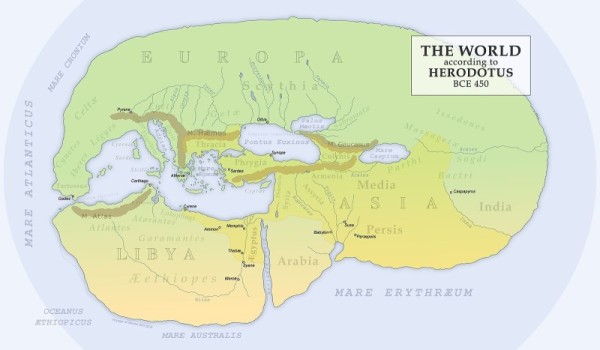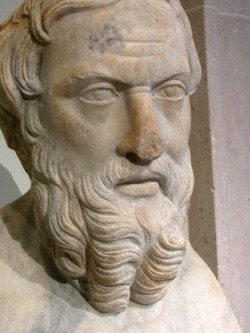Thus the Persians escaped, and the Scythians in their search missed the Persians the second time also . . . .

Translated by George C. Macaulay — our special project presenting the complete Herodotus with URLs for all of those people, places, events, and things which baffles and discourages modern readers.
Previously on Herodotus
141. Now there was with Darius an Egyptian who had a voice louder than that of any other man on earth, and this man Darius ordered to take his stand upon the bank of the Ister and to call Histiaios of Miletos. He accordingly proceeded to do so; and Histiaios, hearing the first hail, produced all the ships to carry the army over and also put together the bridge.
142. Thus the Persians escaped, and the Scythians in their search missed the Persians the second time also: and their judgment of the Ionians is that on the one hand, if they be regarded as free men, they are the most worthless and cowardly of all men, but on the other hand, if regarded as slaves, they are the most attached to their master and the least disposed to run away of all slaves. This is the reproach which is cast against the Ionians by the Scythians.
143. Darius then marching through Thrace arrived at Sestos in the Chersonese; and from that place, he passed over himself in his ships to Asia, but to command his army in Europe he left Megabazos a Persian, to whom Darius once gave honor by uttering in the land of Persia this saying: — Darius was beginning to eat pomegranates, and at once when he opened the first of them, Artabanos his brother asked him of what he would desire to have as many as there were seeds in the pomegranate: and Darius said that he would desire to have men like Megabazos as many as that in number, rather than to have Hellas subject to him. In Persia, I say, he honored him by saying these words, and at this time he left him in command with eight myriads of his army.
144. This Megabazos uttered one saying whereby he left of himself an imperishable memory with the peoples of Hellespont: for being once at Byzantion he heard that the men of Calchedon had settled in that region seventeen years before the Byzantians, and having heard it he said that those of Calchedon at that time chanced to be blind; for assuredly they would not have chosen the worse place, when they might have settled in that which was better, if they had not been blind. This Megabazos it was who was left in command at that time in the land of the Hellespontians, and he proceeded to subdue all who did not take the side of the Medes.
Meanwhile Back in Africa
145. He then was doing thus; and at this very same time a great expedition was being made also against Libya, on an occasion which I shall relate when I have first related this which follows. — The children’s children of those who voyaged in the Argo, having been driven forth by those Pelasgians who carried away at Brauron the women of the Athenians, — having been driven forth I say by these from Lemnos, had departed and sailed to Lacedemon, and sitting down on Mount Taÿgetos they kindled a fire. The Lacedemonians seeing this sent a messenger to inquire who they were and from whence; and they answered the question of the messenger saying that they were Minyai and children of heroes who sailed in the Argo, for these, they said, had put in to Lemnos and propagated the race of which they sprang. The Lacedemonians having heard the story of the descent of the Minyai, sent a second time and asked for what purpose they had come into the country and were causing a fire to blaze. They said that they had been cast out by the Pelasgians, and were come now to the land of their fathers, for most just it was that this should so be done; and they said that their request was to be permitted to dwell with these, having a share of civil rights and a portion allotted to them of the land. And the Lacedemonians were content to receive the Minyai upon the terms which they themselves desired, being most of all impelled to do this by the fact that the sons of Tyndareus were voyagers in the Argo. So having received the Minyai they gave them a share of land and distributed them in the tribes; and they forthwith made marriages, and gave in marriage to others the women whom they brought with them from Lemnos.

CC BY-SA 2.0 image from Wikipedia.
146. However, when no very long time had passed, the Minyai forthwith broke out into insolence, asking for a share of the royal power and also doing other impious things: therefore the Lacedemonians resolved to put them to death; and having seized them they cast them into a prison. Now the Lacedemonians put to death by night all those whom they put to death, but no man by day. When therefore they were just about to kill them, the wives of the Minyai, being native Spartans and daughters of the first citizens of Sparta, entreated to be allowed to enter the prison and come to speech every one with her own husband: and they let them pass in, not supposing that any craft would be praccticed by them. They however, when they had entered, delivered to their husbands all the garments which they were wearing, and themselves received those of their husbands: thus the Minyai having put on the women’s clothes went forth out of prison as women, and having escaped in this manner they went again to Taÿgetos and sat down there.
147. Now at this very same time Theras the son of Autesion, the son of Tisamenos, the son of Thersander, the son of Polyneikes, was preparing to set forth from Lacedemon to found a settlement. This Theras, who was of the race of Cadmos, was mother’s brother to the sons of Aristodemos, Eurysthenes and Procles; and while these sons were yet children, Theras as their guardian held the royal power in Sparta. When however his nephews were grown and had taken the power into their hands, then Theras, being grieved that he should be ruled by others after he had tasted of rule himself, said that he would not remain in Lacedemon, but would sail away to his kinsmen. Now there were in the island which is now called Thera, but formerly was called Callista, descendants of Membliaros the son of Poikiles, a Phoenician: for Cadmos the son of Agenor in his search for Europa put in to land at the island which is now called Thera; and, whether it was that the country pleased him when he had put to land, or whether he chose to do so for any other reason, he left in this island, besides other Phoenicians, Membliaros also, of his own kinsmen. These occupied the island called Callista for eight generations of men, before Theras came from Lacedemon.
– Herodotus, Book IV
| <—Previous | Master List | Next—> |
Herodotus made his living by being interesting. In a world where most people did not read and could not afford to buy a book even if they could, they would pay to listen to Herodotus recite from his books. They would not pay to be bored. In that world, the names that populate his stories would have some general familiarity to his audience. Their obscurity to us is a barrier that this series seeks to break down.
MORE INFORMATION
MAP LIBRARY
Because of lack of detail in maps as embedded images, we are providing links instead, enabling readers to view them full screen.

Leave a Reply
You must be logged in to post a comment.